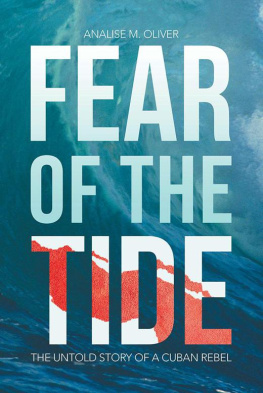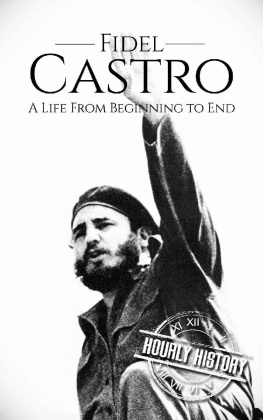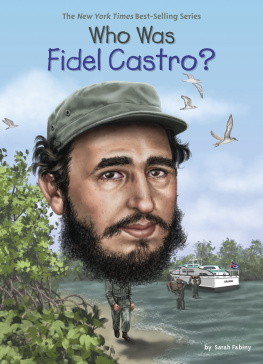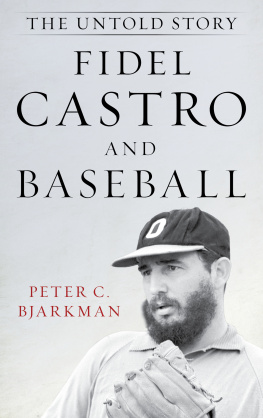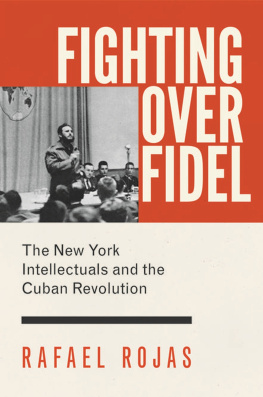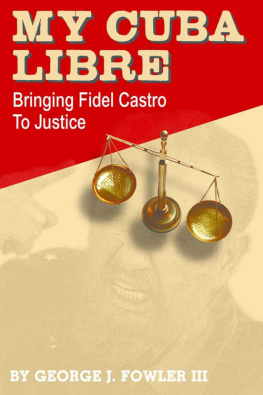FEAR OF THE TIDE
THE UNTOLD STORY OF A CUBAN REBEL
ANALISE M. OLIVER
Copyright 2017 by Analise M. Oliver.
Library of Congress Control Number: 2017911247
ISBN: Hardcover 978-1-5434-3728-7
Softcover 978-1-5434-3729-4
eBook 978-1-5434-3730-0
All rights reserved. No part of this book may be reproduced or transmitted in any form or by any means, electronic or mechanical, including photocopying, recording, or by any information storage and retrieval system, without permission in writing from the copyright owner.
Any people depicted in stock imagery provided by Thinkstock are models, and such images are being used for illustrative purposes only.
Certain stock imagery Thinkstock.
Rev. date: 07/29/2017
Xlibris
1-888-795-4274
www.Xlibris.com
757968
CONTENTS
D EDICATED TO MY father, David Fuentes Martinez, who grew up in Cuba and was a young man during the Cuban Revolution. He saw his country changing for the worse when a tyrant moved into power, threatening to change the Cuban peoples way of life. Rather than give in and accept communism, he stepped into action to try to prevent it. His story is one of strength, courage, and determination and one that is truly inspirational.
Over the years, as he shared his memories, I knew he had an amazing story that had to be told. I cried many times as I wrote thiscried for what he had to endure. His struggle was great and his loss hard to bear. But he did it. He did it for his people and for a country that he loved. However, in the end he had to leave it all behind.
I love you, Dad, with all my heart! You are truly remarkable! You are my hero!
O NE TICKET TO Havana, please, I requested as I slowly pushed the money across the counter. I had never been on a train, but after having a bus ride that terrified me years before, I felt safer using this mode of transportation.
Las Matinas, the rural town I grew up in, with a small population, didnt have a police station, library, or town hall, but we did have a train stop. Located in the province of Pinar del Rio, it was approximately 260 miles from Havana, the capital of Cuba.
Do you want a round-trip ticket, nio ? asked the man behind the counter.
I recognized him. He was a friend of my fathers .
What do you mean, se or? I wasnt sure what he was asking since I had never heard the term he used .
Will you be returning? he clarified. He nodded his head and smiled at me.
No, se or. I am moving to Havana for good! I volunteered excitedly.
I thought about telling him that I was going to meet up with my father, who was already living in Havana, but another man showed up and formed a line behind me.
That will be $1 . 1 5, he said as he pushed my change toward me.
Gracias! I thanked him as I pocketed it and walked to the bench to wait for the train.
I had just left my uncle and aunts house and walked the path through town that led up to the train stop. My father had moved to Havana a few years earlier after landing a new job working on building tunnels under the ocean. He had left me in the care of my aunt and uncle, but before he left, he had given my uncle money to save until the day he could send for me. The letter finally arrived a few days ago. My father had told me his plan and assured me he would send for me when the time was right; I had just turned seventeen years old and would now be able to find employment.
The train station was nearly dilapidated; paint was peeling off the cement walls, the outside corners of the building had crumbling cement, and the awning above the window was hanging down by one of its hinges. The bench I chose to sit on was made of metal, which also had peeling black paint, revealing its worn age. I sat on the edge of the seat, placed my elbow on the arm of the bench, and scratched myself against the chipped paint. Hearing the train whistle as it approached, I looked up from my deep thoughts. The train stopped and opened its doors. I jumped up excitedly and ran toward the line to board. There werent many people on the train, so I picked a seat where I could sit alone, being sure to choose one where I couldnt see out the front windows, remembering that bus ride I had taken so long ago that frightened me. Driving on narrow bumpy roads with oncoming traffic was a terrifying experience for a small child . I picked a seat near the back of the train.
As I sat down, I realized there was no turning back. My heart skipped quickly and I wondered just how much my life was about to change. I was leaving everything I knew behindmost of my family, my way of life, and close friends. I wasnt sure what l a y ahead, but I was ready. I knew this day would come, and now I was actually doing it. I had never lived in a city, nor had I ever been to one. The nearest city to me was Pinar del Rio, and I hadnt had a reason to ever go there. My stomach had a knot with a butterfly sensation that fluttered even faster the farther the train moved away from my home. This was a big step for me. I looked out the window, wishing I had brought a newspaper or book to read so I could distract myself from being nervous .
You are going to be with your papi , David . I consoled myself nearly audibly and looked around to be sure no one had heard me . It had been a couple of years since I saw my father last, and I longed to see him. He had written a couple of letters describing his work and life, which was very different from the life I livedsimple and predictable .
For the rest of the trip, I sat back in my chair and watched the beautiful scenery as it passed me by, recalling childhood memories that both made me smile and cry. I tried hard to hold back tears when I thought of my mother. My dear, beautiful mother, who left me when I was only six years old. I missed her so much, and I wanted so desperately to see her face again, to smell her hair as she hugged me, as she so often did. Memories of her were still just as strong in my mind so many years since her death. My mother was a strong woman, yet her body was made fragile from having major complications with each of her pregnancies, including mine. Of ten pregnancies, she had given birth to six children. I was a middle child .
When my mother went into labor with me, the pain and complications were severe. The local doctor had come to our home to perform the delivery, but after too many hours of excruciating labor pains to no avail, he informed my parents that I was likely in a breach position in the womb. This posed a threat to her life. Labor had started before I had turned around and reached the proper position of headfirst. The doctor explained that if the birth continued, the likelihood of both mother and child surviving was almost impossible. Then he went on to painstakingly explain to my parents that in order to save my mothers life, he would have to perform surgery to remove me from her womb, explaining that I would likely be removed in pieces. Rather than lose both mother and child, he would do his best to save my mother.
Within minutes of the conversation with the doctor, my maternal grandfather arrived at the hospital. He wanted to check on the progress of the delivery, knowing his daughter had difficulty in childbearing. He saw my parents crying and listened to them hysterically describe what the doctor had told them. My grandfather was a politician with many connections. Several of his friends were medical doctors. Upon learning the plan, he stopped the doctor from preparing for surgery and insisted they prepare my mother to leave. Instead, he would take her to the hospital in Havana where he planned to bring her for a second opinion.
Once they arrived at the hospital, my grandfather was able to find one of his friends and then pleaded with him to save both his daughter and his grandchild. The doctor, seeing my mothers condition, immediately pulled a team of doctors together and they successfully performed the first Cesarean section in Cuba, saving us both.
Next page
